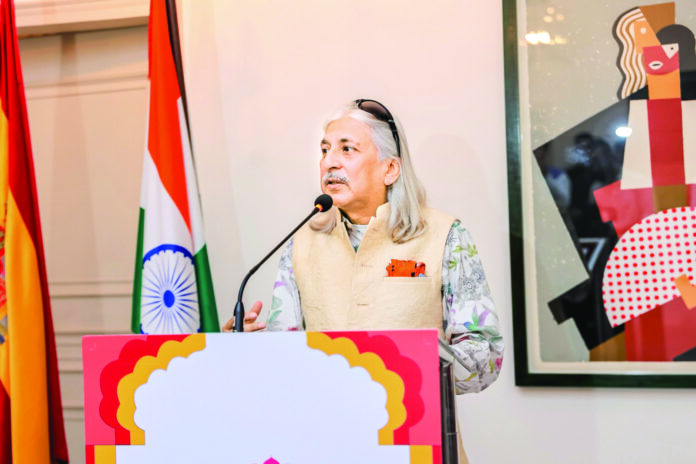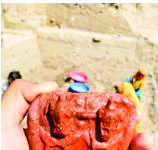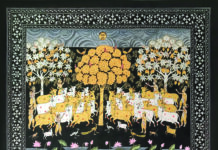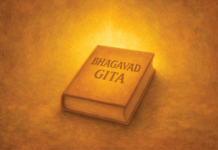In the swirling storm of global cultural events, few have captured the world’s imagination quite like the Jaipur Literature Festival (JLF). What began as a modest gathering under the Rajasthani sun has since evolved into a globe-trotting literary juggernaut. At the heart of this transformation is Teamwork Arts, led by the indefatigable Sanjoy K. Roy, whose vision extends beyond expanding geographies to reshaping narratives and reclaiming histories.
As the 12th edition of JLF London unfolds successfully at the British Library from June 13–15, and with JLF Valladolid, Spain, marking a vibrant return in early June 2025, Roy and team continue their quiet revolution—bringing India’s stories to the world and inviting the world to India.
“Can words be used to build bridges?” Sanjoy Roy muses in conversation. “We have seen—and proven—that they can.”
JLF’s international footprint—stretching from Colorado to Belfast, and from Adelaide to Valladolid—is no accident. It stems from a deep understanding of the world’s evolving cultural fabric. “One of the core reasons behind our international success is that the West is saturated with content about the West, from the West, for the West. There’s a hunger now for other perspectives,” Roy explains.
This hunger is especially palpable in Spain, where JLF Valladolid has found an eager and diverse audience despite the linguistic barrier. “Regardless of whether they speak English, they are all there. You play music, the fountains come alive, and everyone dances. They want that experience because they have no access to another experience,” Roy rejoices.
JLF Valladolid Spain 2025, which took place across Madrid, Valladolid, and Abadía Retuerta from June 5–8, showcased a dynamic convergence of voices such as Josephine Quinn, Marcus du Sautoy, Sheena Patel, Romy Gill, Namita Gokhale, and Shobhaa De. From culinary storytelling to ancient nomads, from folklore to geopolitics, the sessions offered a robust exchange of ideas, cultures, and histories.
Meanwhile, back in London, the British Library has once again become a crucible of literary ferment. With speakers like Hanif Kureishi, Shashi Tharoor, Ira Mukhoty, Javed Akhtar, David Hare, and International Booker Prize winner Banu Mushtaq, JLF London 2025 is delivering an intoxicating mix of politics, memory, food, identity, and artistic resilience.
“JLF continues to be a platform for voices that challenge, inspire, and provoke thought,” says Roy. “We remain committed to creating space for nuanced and considered conversations.”
One of the highlights this year is a session on Heart Lamp, Mushtaq’s fearless portrait of Muslim women’s inner lives in southern India. Another, Blame It on Bollywood, features Akhtar dissecting the creative pulse of Indian cinema, while Crisis in the Age of Chaos assembles global minds to wrestle with rising instability. And in a truly meta moment, Roy himself appears in conversation with BAFTA-winner David Hare about the theatre of life.
Roy is emphatic about why these conversations matter—especially when held in former colonial centres like London. “History has always been written by the victors,” he says. “In the past, we have looked at our own history through the eyes of others—British, French, Portuguese. But today, writers like Ira Mukhoty and Manu Pillai are retelling our stories, reclaiming our perspective.”
His passion for “reclaiming history” is deeply personal. “The British wrote our history in a particular way,” he notes. “But now we can challenge that—using the same archives they used, the same records they maintained. That’s what excites me.”
And what better place to have this dialogue than the British Library—once a symbol of imperial knowledge, now a venue for re-examining it?
For Roy, the rise of JLF’s global editions is not just about content—it’s about context. “We are living in an age of experience,” he asserts. “Post-pandemic, people are hungry for physical, meaningful gatherings. Digital content can inform, but it cannot replace the magic of shared space.”
He points to the rapid decline in mall footfalls and the rise in experiential advertising. “We are seeing that cultural events now have a real, measurable impact on the economy,” he explains. “When Coldplay did three concerts in Ahmedabad, ₹72 crores was paid in GST over three days. Culture is not peripheral—it is central.”
That understanding drives Teamwork Arts’ global strategy—from community-building in Colorado to the cross-border experiment in Ireland, which will soon feature a pan-Ireland edition of the festival. “The then-mayor of Boulder told me, ‘If we don’t learn how to deal with diversity, we as a city will die.’ That’s why we went there.”
Teamwork Arts now produces over 30 festivals across 45 cities and 19 countries each year. Its digital initiatives during the pandemic—like JLF Brave New World and Words Are Bridges—reached over 27 million viewers, while its latest venture, the Jaigarh Heritage Festival, is reimagining royal legacy within a contemporary frame.
“It’s about taking India to the world—and bringing the world to India,” says Roy.
It’s also about legacy. As Roy prepares to release his book Ghosts in My Room—a chronicle of his personal supernatural experiences—he hints that storytelling, whether spectral or historical, remains at the core of everything he does. “Stories help us understand who we are, where we came from, and where we’re going.”
The ever-growing demand for what Teamwork Arts is offering is undeniable. But Roy remains grounded. “Arts always follow the money,” he says. “Delhi became the arts capital because the money is here now. Earlier it was Calcutta, then Bombay. Wherever there’s power, the arts follow.”
But in JLF’s case, perhaps the reverse is also true—where JLF goes, power listens.








